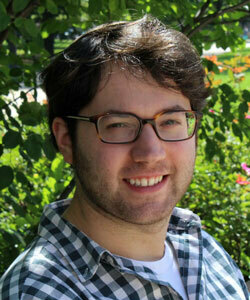
Dov Honick, a doctoral candidate in the Medieval Institute, has been awarded two prestigious positions, first at the American Academy in Rome, then at Yale University.
"I am immensely grateful to my dissertation committee and other mentors at the Medieval Institute, all of whom have played a vital role in guiding my academic progress towards these fellowships," Honick said. "My success with these applications is a testament to the strength of the Medieval Institute’s interdisciplinary training."
As the Paul Mellon Rome Prize winner, Honick will be in residence during the 2023–24 academic year at the American Academy in Rome, where he'll complete his dissertation “Mysticism, Polemic, and the Origins of Christian Hebraism.”
He'll establish connections with researchers and institutions in Italy and Europe, foster collaborations and exchanges, and contribute to the advancement of knowledge in his field. Honick, who in 2019 earned a Master of Medieval Studies at Notre Dame, also will have a unique opportunity to work at the Biblioteca Apostolica Vaticana, one of the great manuscript libraries in Europe.
After a year in Rome, Honick will be the Blaustein Post Doctoral Associate in Medieval Jewish History in the Judaic Studies Program at Yale University for two years.
He'll revise and expand his dissertation into a book project, and complete a secondary research project, “Baptized Hebrews, Circumcised Latins: Perceptions of Sacred Language among Jews and Christians in Twelfth-Century Europe.” For this project, he'll examine the religious, ethnic, and linguistic tensions raised by opposing views of Hebrew as a sacred language among Christians.
In addition to having access to excellent resources, mentorship from top scholars, and opportunities for professional development, he'll broaden his research profile, deepen his knowledge of medieval Jewish history, and contribute to ongoing conversations within the field.
Honick's work in midrashic transmission lies mainly with polemical writers frequently understudied by scholars of Christian Hebraism. His dissertation is a source-critical study of the anti-Jewish polemics written in the first half of the 12th century by Petrus Alphonsi and Peter the Venerable — who are generally recognized as the first Christian authors to quote extensively from the Talmud. Historians frequently link their familiarity with the Talmud to the emergence of rising anti-Jewish prejudice in the 12th century.
In his dissertation, Honick challenges the commonly accepted assumption that Alphonsi and Peter the Venerable relied primarily on the Talmud as their source for the rabbinic Aggadah that they regularly cite and disparage. Instead, he argues they likely drew on the vast corpus of minor midrashic, homiletic, and mystical texts that circulated during the 12th century and were often bound in the same codices.
The identification of the diverse midrashic and mystical sources that Alphonsi and Peter the Venerable used is an important contribution to knowledge of the motivations, theological challenges, and exposure to rabbinic literature that underpinned these authors’ specific works.
Honick's novel approach to these polemical works provides a blueprint for the future study of medieval Hebrew and Latin works that demonstrate signs of cultural interpenetration. It also challenges scholars to think more expansively about the definition of Christian Hebraism as a movement that incorporates polemical works.
Additionally, it troubles the narrative that the increase in anti-Jewish sentiment in the 12th and 13th centuries was a response to the Talmud and rabbinic legal culture in particular, and argues that Christian polemicists encountered a broader cultural ecosystem that incorporated a wide range of rabbinic and popular text and practice.
Originally published by at medieval.nd.edu on June 26, 2023.


